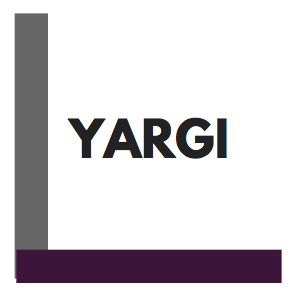A statically typed object-oriented programming language written in Python
Variables can be declared in single variable form int x; or multiple variable form int x, y;
int x;
float y;
bool z;
string s;
x = 5;
y = 10;
z = true;
w = "Hi!";
Arithmetic: +, -, *, /
Logic: and, or
Relational: >, <, >=, <=, ==, !=
Function declaration follows the syntax:
fun FUN_NAME( [<ARGS>,] ) [: RETURN_TYPE] {
< DECLARATIONS >
< STATEMENTS >
}
A function with no return value:
fun sayHi() {
write("Hi");
}
A function with return value:
fun sum(int a, int b): int {
return a + b;
}
The syntax for if|else flow control statements is as follows:
if (< expression >) {
< statements >
} else {
< statements >
}
if (10 > 5 + 4) {
write("Hi!");
} else {
write("Bye!");
}
Yargi does not support traditional else if branches, instead we have the when flow control statement.
The syntax for when flow control statements is as follows:
when {
< expresion > -> { < statements > }
< expresion > -> { < statements > }
[ else -> { <statements> } ]
}
when {
5 > a -> { write("Hi"); }
true -> {
write("Hola");
....
}
1 + 1 == 2 -> { write("1 plus 1 is two); }
else -> {
write("None of the above");
}
}
The else branch is optional:
when {
true -> { write("Hi"); }
false -> { write("Hola"); }
}
The syntax for for in loops is as follows:
for (< var > in < start >..< end >) {
< statements >
}
for (i in 0..10) {
write(i);
}
for (i in a..b) {
write(i);
}
The syntax for while loops is as follows:
while ( <expression> ) {
< statements >
}
while (x < 10) {
write(x);
x = x + 1;
}
Classes are defined with the following syntax:
class CLASS_NAME( [CONSTRUCTOR_ARGS,] ) [: PARENT_CLASS_NAME( [ARGS,] )] {
[ global vars ]
[ functions ]
[ main() { < statements >} ]
}
class Calculator(int total) {
fun total(): int {
return total;
}
fun add(int n) {
total = total + n;
}
fun sum(int a, int b): int {
return a + b;
}
fun sub(int a, int b): int {
return a - b;
}
}
class Main {
Calculator calculator;
main() {
calculator = Calculator(50);
write(calculator.total()); // prints 50
calculator.add(30);
write(calculator.total()); // prints 80
write(calculator.sum(2, 2)); // prints 4
write(calculator.sub(2, 2)); // prints 0
}
}
class Person(int id, string name) {
fun talk() {
write("Hi! My name is ", name);
}
fun walk() {
write(name, " is walking...");
}
}
class Student(int id, string name, string major, int year) : Person(id, name) {
fun talk() {
write("Hi! My name is ", name, " and I'm a ", major, " student");
}
}
class Main {
Person bigTuna;
Student nardDog;
fun main() {
bigTuna = Person(1, "Jim");
nardDog = Student(2, "Andy", "CS", 3);
bigTuna.talk(); // prints "Hi! My name is Jim"
nardDog.talk(); // prints "Hi! My name is Andy and I'm a CS student"
bigTuna.walk(); // prints "Jimothy is walking..."
nardDog.walk(); // prints "Andy is walking..."
}
}
Yargi supports a special type of class whose main purpose is to hold data. Its fields are public and immutable.
Its syntax is as follows:
data class CLASS_NAME([<ARGS>,])
data class Person(int id, string name, string lastname)
data class Dog(
int id,
string name,
string breed,
int age,
string color,
int owner
)
Interfaces are defined with the following syntax:
interface INTERFACE_NAME {
< interface funs >
}
interface Bike {
fun accelerate();
fun brake();
fun changeGear(int newGear);
}
Then to implement it:
class RoadBike : Bike {
fun accelerate() {
// TODO: implement
}
fun brake() {
// TODO: implement
}
fun changeGear(int newGear) {
// TODO: implement
}
}
To implement multiple interfaces separate them with comas:
interface AccidentListener {
onCrash();
}
class RoadBike : Bike, AccidentListener {
fun accelerate() {
// TODO: implement
}
fun brake() {
// TODO: implement
}
fun changeGear(int newGear) {
// TODO: implement
}
fun onCrash() {
// TODO: implement
}
}
To extend a class and have it implement interfaces at the same time put the superclass constructor call at the very end:
class RoadBike : Bike, AccidentListener, BaseBike() {
...
}
